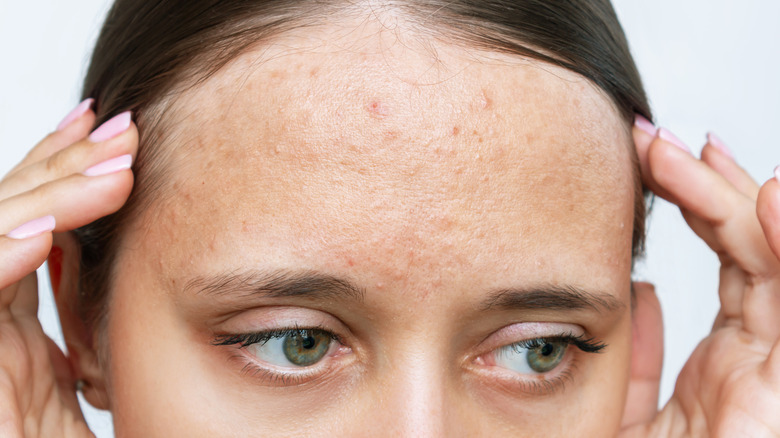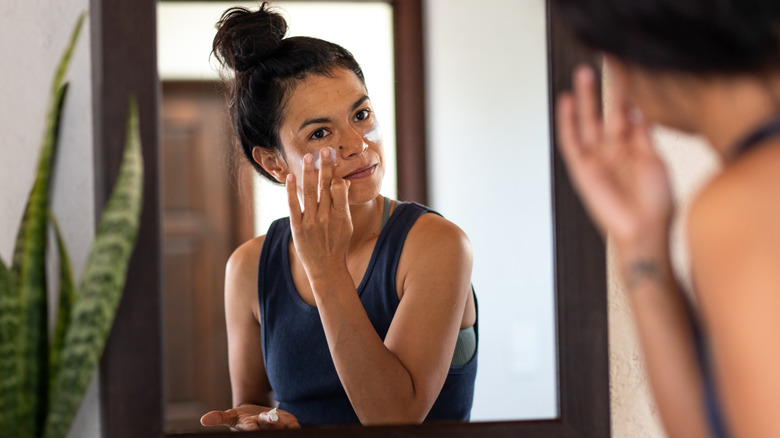What Causes Forehead Acne & How Can You Treat It?
Ideally, we all would prefer to leave acne in our teenage years, but for a lot of us, it continues to pop up in adulthood. Forehead acne, specifically, can be especially stubborn since it's an area of our face that gets oily fast. It can be caused by several things — from simple things like wearing a headband for too long, to more internal factors like hormonal changes.
There are a few different types of acne that can show up anywhere, and this includes the forehead. There are the common whiteheads and blackheads, known as comedonal acne. These can progress into larger bumps that become inflamed and filled with pus, also known as pustules. Cystic and nodular acne are more severe kinds that develop underneath the skin and can be pretty painful. These can be tricky to treat on your own without help from a specialist. Acne is a totally normal issue that a lot of people deal with, but if it's getting in the way of your confidence, there are things you can do about it.
Causes of forehead acne
The causes of forehead acne differ for each individual. As with other parts of the face, forehead acne occurs when the pores are clogged with oil, dead skin cells, and bacteria. Excess oil production can be caused by a number of factors, whether it's internal or external. Things like genetics, hormonal imbalances, and poor diet play a role in acne, along with hygiene habits like not cleansing your face regularly, sleeping in your makeup, using greasy hair products, or not washing your pillowcases enough.
According to a dermatologist at the Dermatology and Skin Surgery Center of Wilmington, hormonal acne commonly shows up on your chin and jawline, but it's possible that hormonal changes can cause a breakout on your forehead as well. Hormonal acne is brought on by excess androgen hormones. If you notice a flare-up of acne around the time of your period, chances are it's hormonal acne. Additionally, it's common to get acne during menopause, according to research from the International Journal of Women's Health.
Some medications may also cause acne, though it's not exactly clear if they cause forehead acne specifically. According to experts at Medical News Today, certain steroids, anticonvulsants, barbiturates, and lithium have a side effect of acne. Stress can also lead to hormonal changes, which can bring acne on as well. Once you pinpoint the causes of your forehead acne, you can understand how to prevent and treat it.
Treatment options
Forehead acne can be bacterial or hormonal, and the type of acne requires different treatments. Besides the usual advice of washing your face and not picking at your skin, stubborn forehead acne often requires over-the-counter remedies. For small whiteheads and blackheads that pop up from time to time, over-the-counter products with benzoyl peroxide, salicylic acid, or adapalene may work for you. These can be found in cleansers, gels, spot treatments, and serums wherever you buy skincare.
Benzoyl peroxide specifically targets acne-causing bacteria while also removing excess oil. Salicylic acid exfoliates the skin and eliminates dead skin cells that clog the pores. According to experts at Healthline, salicylic acid works best for blackheads and whiteheads, while benzoyl peroxide is more effective for pustular acne. Adapalene, a topical retinoid, is a store-bought treatment that has proven effective in fighting acne.
If your forehead acne doesn't respond well to over-the-counter treatments, it may be time to talk to a dermatologist. They can help figure out the type of acne you have, whether it's hormonal or from other factors. When acne is persistent and severe, it's possible that hormonal changes are the cause. A doctor can prescribe hormonal treatments, including birth control or Spironolactone, which is a medication that can be taken orally or topically, prescribed for people assigned female at birth with persistent acne. Even if your acne isn't hormonal, the doctor may still be able to give you stronger medication for persistent acne, like antibiotics and retinoids.


